

SUBSCRIBE TO OUR FREE NEWSLETTER
Daily news & progressive opinion—funded by the people, not the corporations—delivered straight to your inbox.
5
#000000
#FFFFFF
To donate by check, phone, or other method, see our More Ways to Give page.


Daily news & progressive opinion—funded by the people, not the corporations—delivered straight to your inbox.

President-elect Donald Trump walks out to deliver brief remarks to reporters at the Mar-a-lago Club in Palm Beach, December 28, 2016. (Photo: Reuters / Jonathan Ernst)
When Paul Ryan and top congressional Republicans gathered on the evening of January 20, 2009, to plot a strategy of absolute and unrelenting opposition to Barack Obama presidency, and to the House and Senate Democrats who had received a mandate from the American people to work with the enormously popular president-elect, California Congressman Kevin McCarthy told the group: "If you act like you're the minority, you're going to stay in the minority. We've gotta challenge them on every single bill and challenge them on every single campaign."
"Democrats have dramatically greater justification for opposing the Trump-Ryan agenda in 2017 than Ryan and his fellow Republicans had for opposing the Obama agenda in 2009."
That determination to resist the Obama agenda offended Democrats and thrilled Republicans. But, at the most fundamental level, it was nothing more than Politics 101. An opposition party exists to oppose the party in power. Ryan and his fellow partisans understood this in 2009.
Yet, now, Ryan and the Republicans are whining about the failure of Democrats to play the role of a "loyal opposition" that willingly compromises and cooperates with President-elect Donald Trump and the wrecking crew the incoming administration has assembled to destroy essential programs - beginning with Medicaid - while redistributing wealth to the billionaire class that is its core constituency.
The Speaker of the House claims Trump "earned a mandate" for a "go big, go bold" agenda, while Trump "counselor" Kellyanne Conway is not just claiming a mandate but griping that critics of the billionaire are "attempting to foment a permanent opposition that is corrosive to our constitutional democracy."
Fifty-four percent of Americans voted for someone other than Donald Trump. He has earned no political honeymoon.
"The left is trying to delegitimize his election," grumbles Conway. "They're trying to deny him what he just earned."
Ryan and Conway should brush up on their math. Trump earned 2.9 million fewer votes than his Democratic rival. The Republican earned just 46.1 percent of the popular vote. Only a narrow Electoral College advantage made him president-elect.
Republican Senate candidates earned a little over 42 percent of the vote in contests across the country. Far from receiving the a full-throttle endorsement from an electorate that is enthusiastic about approving Trump's extreme Cabinet picks and potentially even more extreme judicial nominees, the Senate Republican Caucus lost two seats.
Republican House candidates earned roughly 49 percent of the vote in contests across the country. Far from receiving a full-throttle endorsement of an electorate that is enthusiastic about dismembering Medicaid, Medicare and Social Security and redistributing wealth upward to the billionaire class, Ryan's House caucus lost six seats.
By any reasonable measure, Trump, Ryan and their allies lack the broad popular approval that Obama and congressional Democrats had on January 20, 2009. Yet, while Ryan and his compatriots resolved in 2009 to oppose a president and a Congress that enjoyed a mandate, they now demand acquiescence to a president and a Congress that lack a mandate.
It is absurd to claim that this administration and this Congress enjoy enthusiastic popular support. They don't.
It is equally absurd to claim that the simple notation of the fact that this president and his allies will come to power with minority rather than majority support is an attempt to "delegitimize the election." Conway has the calculus precisely wrong. Claiming a mandate when no mandate exists is the real attempt to delegitimize the election - by denying the reality that most Americans did not vote for Trump or for the Republican Senate that will soon attempt to rubber-stamp his nominees for Cabinet posts and the extreme agenda advanced by Ryan in the House.
The irrefutable fact on which to base the consideration of politics in the New Year extends from the election results of old year: Democrats have dramatically greater justification for opposing the Trump-Ryan agenda in 2017 than Ryan and his fellow Republicans had for opposing the Obama agenda in 2009. Instead of the "loyal opposition," Democrats should position themselves as the legitimate (and necessary) opposition to an administration and an agenda that has no mandate.
Trump and Musk are on an unconstitutional rampage, aiming for virtually every corner of the federal government. These two right-wing billionaires are targeting nurses, scientists, teachers, daycare providers, judges, veterans, air traffic controllers, and nuclear safety inspectors. No one is safe. The food stamps program, Social Security, Medicare, and Medicaid are next. It’s an unprecedented disaster and a five-alarm fire, but there will be a reckoning. The people did not vote for this. The American people do not want this dystopian hellscape that hides behind claims of “efficiency.” Still, in reality, it is all a giveaway to corporate interests and the libertarian dreams of far-right oligarchs like Musk. Common Dreams is playing a vital role by reporting day and night on this orgy of corruption and greed, as well as what everyday people can do to organize and fight back. As a people-powered nonprofit news outlet, we cover issues the corporate media never will, but we can only continue with our readers’ support. |
When Paul Ryan and top congressional Republicans gathered on the evening of January 20, 2009, to plot a strategy of absolute and unrelenting opposition to Barack Obama presidency, and to the House and Senate Democrats who had received a mandate from the American people to work with the enormously popular president-elect, California Congressman Kevin McCarthy told the group: "If you act like you're the minority, you're going to stay in the minority. We've gotta challenge them on every single bill and challenge them on every single campaign."
"Democrats have dramatically greater justification for opposing the Trump-Ryan agenda in 2017 than Ryan and his fellow Republicans had for opposing the Obama agenda in 2009."
That determination to resist the Obama agenda offended Democrats and thrilled Republicans. But, at the most fundamental level, it was nothing more than Politics 101. An opposition party exists to oppose the party in power. Ryan and his fellow partisans understood this in 2009.
Yet, now, Ryan and the Republicans are whining about the failure of Democrats to play the role of a "loyal opposition" that willingly compromises and cooperates with President-elect Donald Trump and the wrecking crew the incoming administration has assembled to destroy essential programs - beginning with Medicaid - while redistributing wealth to the billionaire class that is its core constituency.
The Speaker of the House claims Trump "earned a mandate" for a "go big, go bold" agenda, while Trump "counselor" Kellyanne Conway is not just claiming a mandate but griping that critics of the billionaire are "attempting to foment a permanent opposition that is corrosive to our constitutional democracy."
Fifty-four percent of Americans voted for someone other than Donald Trump. He has earned no political honeymoon.
"The left is trying to delegitimize his election," grumbles Conway. "They're trying to deny him what he just earned."
Ryan and Conway should brush up on their math. Trump earned 2.9 million fewer votes than his Democratic rival. The Republican earned just 46.1 percent of the popular vote. Only a narrow Electoral College advantage made him president-elect.
Republican Senate candidates earned a little over 42 percent of the vote in contests across the country. Far from receiving the a full-throttle endorsement from an electorate that is enthusiastic about approving Trump's extreme Cabinet picks and potentially even more extreme judicial nominees, the Senate Republican Caucus lost two seats.
Republican House candidates earned roughly 49 percent of the vote in contests across the country. Far from receiving a full-throttle endorsement of an electorate that is enthusiastic about dismembering Medicaid, Medicare and Social Security and redistributing wealth upward to the billionaire class, Ryan's House caucus lost six seats.
By any reasonable measure, Trump, Ryan and their allies lack the broad popular approval that Obama and congressional Democrats had on January 20, 2009. Yet, while Ryan and his compatriots resolved in 2009 to oppose a president and a Congress that enjoyed a mandate, they now demand acquiescence to a president and a Congress that lack a mandate.
It is absurd to claim that this administration and this Congress enjoy enthusiastic popular support. They don't.
It is equally absurd to claim that the simple notation of the fact that this president and his allies will come to power with minority rather than majority support is an attempt to "delegitimize the election." Conway has the calculus precisely wrong. Claiming a mandate when no mandate exists is the real attempt to delegitimize the election - by denying the reality that most Americans did not vote for Trump or for the Republican Senate that will soon attempt to rubber-stamp his nominees for Cabinet posts and the extreme agenda advanced by Ryan in the House.
The irrefutable fact on which to base the consideration of politics in the New Year extends from the election results of old year: Democrats have dramatically greater justification for opposing the Trump-Ryan agenda in 2017 than Ryan and his fellow Republicans had for opposing the Obama agenda in 2009. Instead of the "loyal opposition," Democrats should position themselves as the legitimate (and necessary) opposition to an administration and an agenda that has no mandate.
When Paul Ryan and top congressional Republicans gathered on the evening of January 20, 2009, to plot a strategy of absolute and unrelenting opposition to Barack Obama presidency, and to the House and Senate Democrats who had received a mandate from the American people to work with the enormously popular president-elect, California Congressman Kevin McCarthy told the group: "If you act like you're the minority, you're going to stay in the minority. We've gotta challenge them on every single bill and challenge them on every single campaign."
"Democrats have dramatically greater justification for opposing the Trump-Ryan agenda in 2017 than Ryan and his fellow Republicans had for opposing the Obama agenda in 2009."
That determination to resist the Obama agenda offended Democrats and thrilled Republicans. But, at the most fundamental level, it was nothing more than Politics 101. An opposition party exists to oppose the party in power. Ryan and his fellow partisans understood this in 2009.
Yet, now, Ryan and the Republicans are whining about the failure of Democrats to play the role of a "loyal opposition" that willingly compromises and cooperates with President-elect Donald Trump and the wrecking crew the incoming administration has assembled to destroy essential programs - beginning with Medicaid - while redistributing wealth to the billionaire class that is its core constituency.
The Speaker of the House claims Trump "earned a mandate" for a "go big, go bold" agenda, while Trump "counselor" Kellyanne Conway is not just claiming a mandate but griping that critics of the billionaire are "attempting to foment a permanent opposition that is corrosive to our constitutional democracy."
Fifty-four percent of Americans voted for someone other than Donald Trump. He has earned no political honeymoon.
"The left is trying to delegitimize his election," grumbles Conway. "They're trying to deny him what he just earned."
Ryan and Conway should brush up on their math. Trump earned 2.9 million fewer votes than his Democratic rival. The Republican earned just 46.1 percent of the popular vote. Only a narrow Electoral College advantage made him president-elect.
Republican Senate candidates earned a little over 42 percent of the vote in contests across the country. Far from receiving the a full-throttle endorsement from an electorate that is enthusiastic about approving Trump's extreme Cabinet picks and potentially even more extreme judicial nominees, the Senate Republican Caucus lost two seats.
Republican House candidates earned roughly 49 percent of the vote in contests across the country. Far from receiving a full-throttle endorsement of an electorate that is enthusiastic about dismembering Medicaid, Medicare and Social Security and redistributing wealth upward to the billionaire class, Ryan's House caucus lost six seats.
By any reasonable measure, Trump, Ryan and their allies lack the broad popular approval that Obama and congressional Democrats had on January 20, 2009. Yet, while Ryan and his compatriots resolved in 2009 to oppose a president and a Congress that enjoyed a mandate, they now demand acquiescence to a president and a Congress that lack a mandate.
It is absurd to claim that this administration and this Congress enjoy enthusiastic popular support. They don't.
It is equally absurd to claim that the simple notation of the fact that this president and his allies will come to power with minority rather than majority support is an attempt to "delegitimize the election." Conway has the calculus precisely wrong. Claiming a mandate when no mandate exists is the real attempt to delegitimize the election - by denying the reality that most Americans did not vote for Trump or for the Republican Senate that will soon attempt to rubber-stamp his nominees for Cabinet posts and the extreme agenda advanced by Ryan in the House.
The irrefutable fact on which to base the consideration of politics in the New Year extends from the election results of old year: Democrats have dramatically greater justification for opposing the Trump-Ryan agenda in 2017 than Ryan and his fellow Republicans had for opposing the Obama agenda in 2009. Instead of the "loyal opposition," Democrats should position themselves as the legitimate (and necessary) opposition to an administration and an agenda that has no mandate.
"Imagine if federal worker unions and Democratic Party officials showed up at the plant gate of a company that was about to close its doors," said one labor advocate recently. "Why aren't the Democrats doing this?"
Congressman Ro Khanna is raising the alarm about mass layoffs in the U.S. economy resulting from President Donald Trump's failed economic policies. Over 4,000 factory workers lost their jobs this week due to firings or plant closures.
On Thursday, automaker Stellantis, citing conditions created by Trump's tariffs, announced temporary layoffs for 900 workers, represented by the United Auto Workers (UAW). "The affected U.S. employees," reported CNN, "work at five different Midwest plants: the Warren Stamping and Sterling Stamping plants in Michigan, as well as the Indiana Transmission Plant, Kokomo Transmission Plant and Kokomo Casting Plant, all in Kokomo, Indiana."
In a social media thread on Saturday night, Rep. Ro Khanna (D-Calif.)—a lawmaker who has advocating loudly, including in books and in Congress, for an industrialization policy that would bring manufacturing jobs back to the United States—posted a litany of other layoffs announced recently as part of the economic devastation and chaos unleashed by Trump as well as conditions that reveal how vulnerable U.S. workers remain.
"This week," Khann wrote, "19 factories had mass layoffs, 15 closed, and 4,134 factory workers across America lost their jobs. Cleveland-Cliffs laid off 1,200 workers in Michigan and Minnesota as they deal with the impact of Trump's tariffs on steel and auto imports."
"We need jobs and currently at this time, the majority of the companies that we work with and represent our members at are not hiring." —Mark DePaoli, UAW
For union leaders representing those workers at Cleveland-Cliffs, they said "chaos" was the operative word. "Chaos. You know? A lot of questions. You've got a lot of people who worked there a long time that are potentially losing their job," Bill Wilhelm, a servicing representative and editor with UAW Local 600, told local ABC News affiliate WXYZ-Channel 7.
The United Auto Workers says the layoff fund set aside for those losing their jobs won't last long and find them new jobs of that quality will not be easy. "Our first concern will be to look around at all the companies where we have members and see if we can find jobs," said the local's 1st vice president, Mark DePaoli. "I mean, jobs are going to be the key. We need jobs and currently at this time, the majority of the companies that we work with and represent our members at are not hiring."
The pain of workers in families in Dearborn, as indicated by Khanna's thread, is just the tip of the iceberg. In post after post, he cataloged a stream of new layoffs impacting workers nationwide and across various sectors:
With public sector workers being fired in massive numbers nationwide due to the blitzkrieg unleashed by the Elon Musk-led Department of Government Efficiency, or DOGE, private sector workers are no strangers to mass layoffs within a U.S. economy dominated by corporate interests and union density still at historic lows.
Les Leopold, executive director of the Labor Institute who has been sounding the alarm for years about the devastation associated with mass layoffs, wrote recently about how the situation is even worse than he previously understood. On top of existing corporate greed and the stock buyback phenomena driving many of the mass layoffs in the private sector, Trump's mismanagement of tariff and trade policy is almost certain to make things worse, triggering more job losses in addition to higher costs on consumer goods.
In order to combat Trump, Leopold wrote last month, "Democrats should take a page from Trump and put job protection on the top of their agenda. As tariffs bite and cause job destruction, the Democrats should show up and support those laid-off workers."
Instead of simply calling Trump's tariffs "insane," which many rightly have, the Democrats "should call them job-killing tariffs," advised Leopold. "As prices rise, they can blame Trump for that as well."
With Trump's economic policies coming into full view, the picture is bleak for businesses large and small—and that means more pain for workers.
As Axios' Ben Berkowitz reported Saturday. "When everything gets more expensive everywhere because of tariffs, that starts a cycle for businesses, too — one that might end with layoffs, bankruptcies, and higher prices for the survivors' customers," he explained. "The cycle is just starting now, but the pain is immediate."
The "big picture," Berkowitz continued, is this:
The stock market is not the economy, but if you want a decent proxy for Main Street businesses, look at the Russell 2000, a broad measure of the stock market's small companies across industries.
—It's down almost 20% this year alone.
—That in and of itself doesn't make a business turn the lights off, but it says something about public confidence in their prospects.
—"The market is like a real time poll ... this is going to impact all businesses in one way or another undoubtedly," Ken Mahoney of Mahoney Asset Management wrote Friday.
In Sunday comments to Common Dreams, Leopold wanted to know where Khanna and other Democrats were last year when John Deere laid off a thousand workers.
"What do the progressive Democrats have to say about the tens of thousands of mass layoffs that take place each month? Radio silence," he said. "It would be useful if they had a policy that addressed Wall Street induced mass layoffs rather than just opposing tariffs, but I wouldn't bet on that."
On the question of silence and who, ultimately, will stand up for American workers—whether in the public or private sector—it's not clear who will emerge as a true defender or what forces would galvanize to truly represent the interests of the nation's working class.
"Imagine if federal worker unions and Democratic Party officials showed up at the plant gate of a company that was about to close its doors to finance hefty stock buybacks for its billionaire owners," Leopold wrote in early March. "A show of support for their fellow layoff victims and a unity message aimed at stopping billionaire job destruction would be simple to craft and easy to share. It would be news."
"Why aren't the Democrats doing this?" he asked.
"Thank you to the hundreds of thousands of Americans across the country who are standing up and speaking out for our voting rights, fundamental freedoms, and essential services like Social Security and Medicare."
In communities large and small across the United States on Saturday, hundreds of thousands of people collectively took to the streets to make their opposition to President Donald Trump heard.
The people who took part in the organized protests ranged from very young children to the elderly and their message was scrawled on signs of all sizes and colors—many of them angry, some of them funny, but all in line with the "Hands Off" message that brought them together.
"Thank you to the hundreds of thousands of Americans across the country who are standing up and speaking out for our voting rights, fundamental freedoms, and essential services like Social Security and Medicare," said the group Stand Up America as word of the turnout poured in from across the country.
A relatively small, but representative sample of photographs from various demonstrations that took place follows.
Demonstrators gather on Boston Common, cheering and chanting slogans, during the nationwide "Hands Off!" protest against US President Donald Trump and his advisor, Tesla CEO Elon Musk, in Boston, Massachusetts on April 5, 2025. (Photo by Joseph Prezioso / AFP)

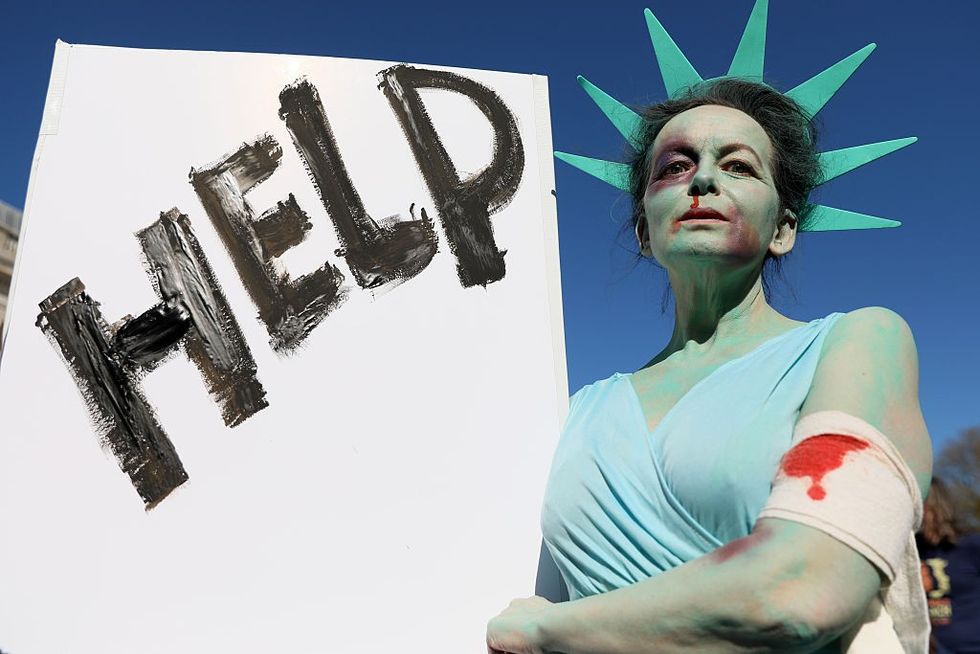


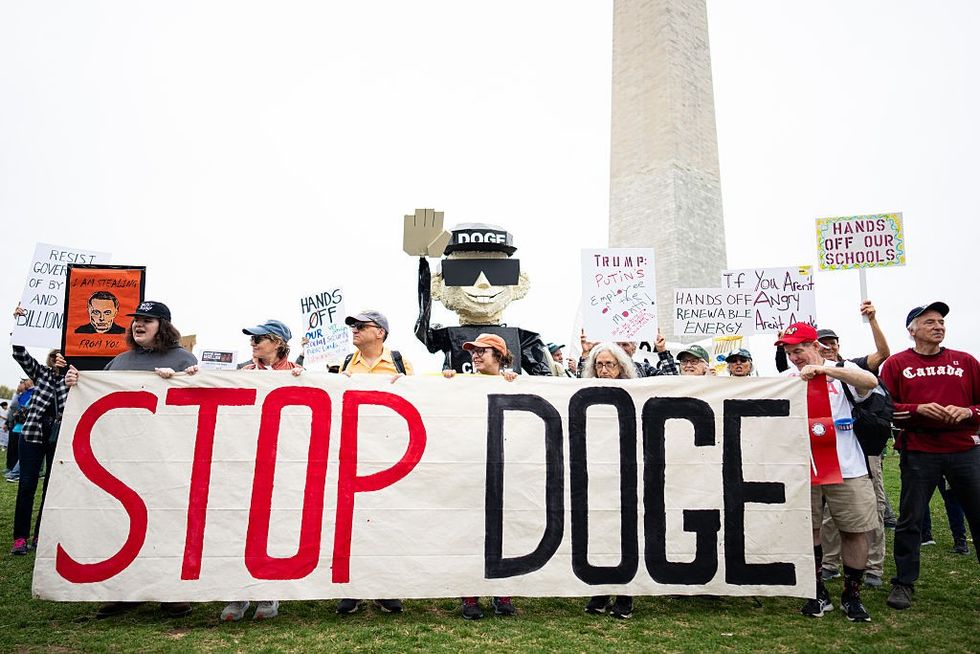



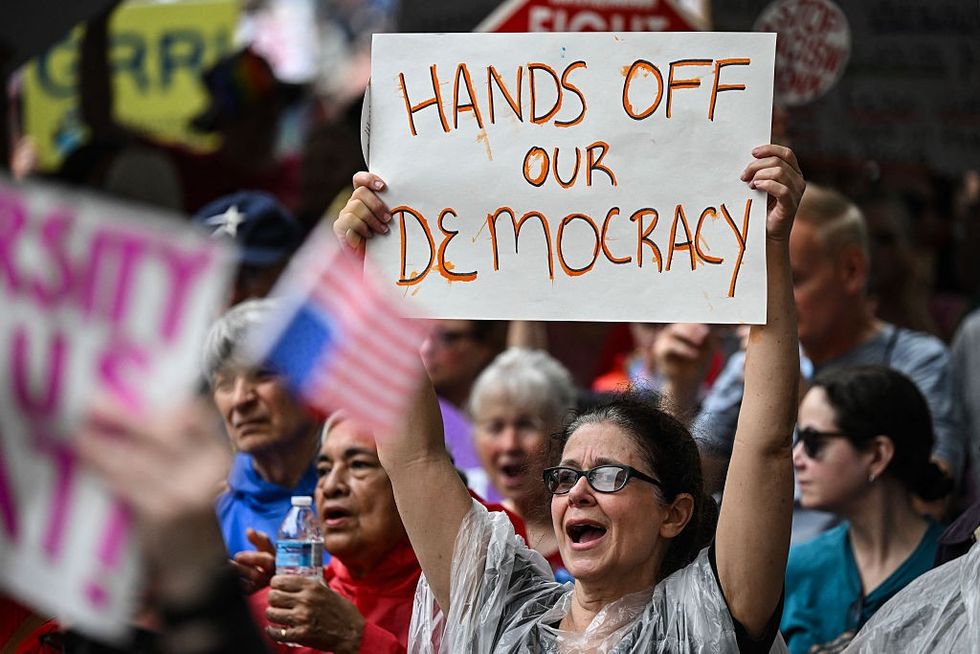


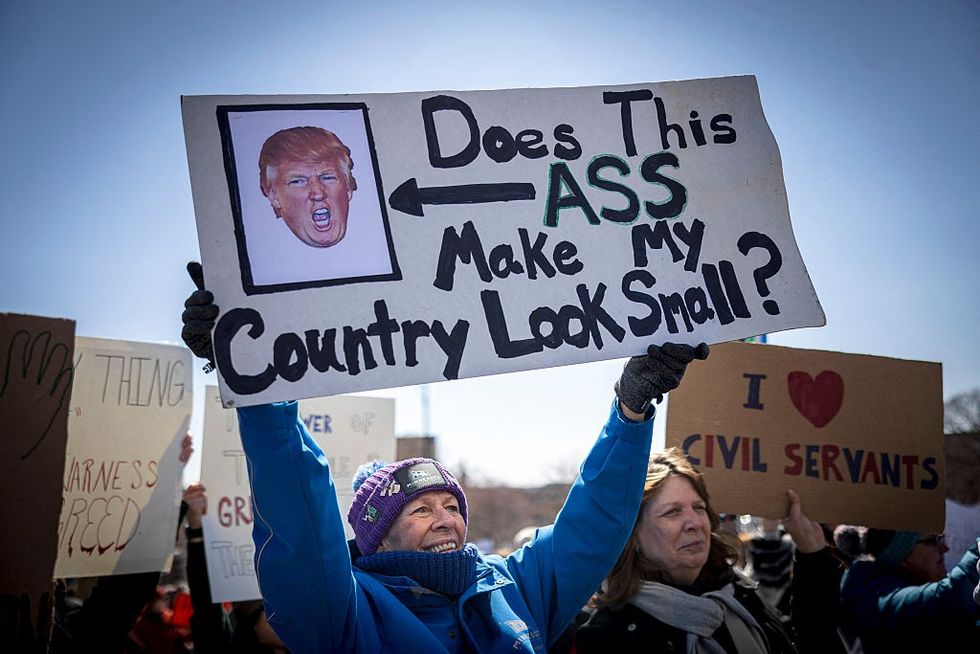
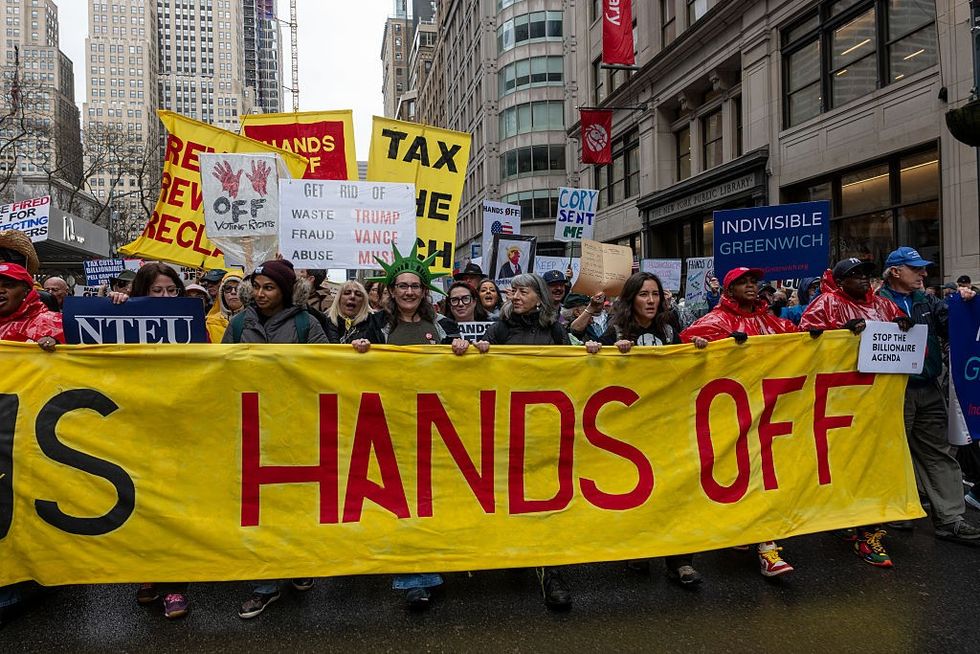



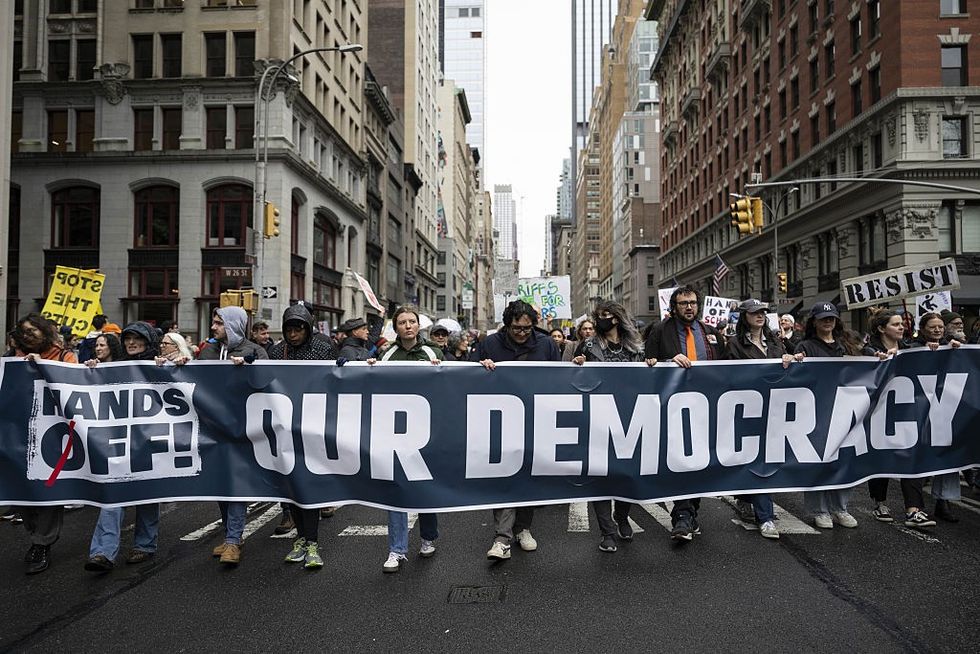
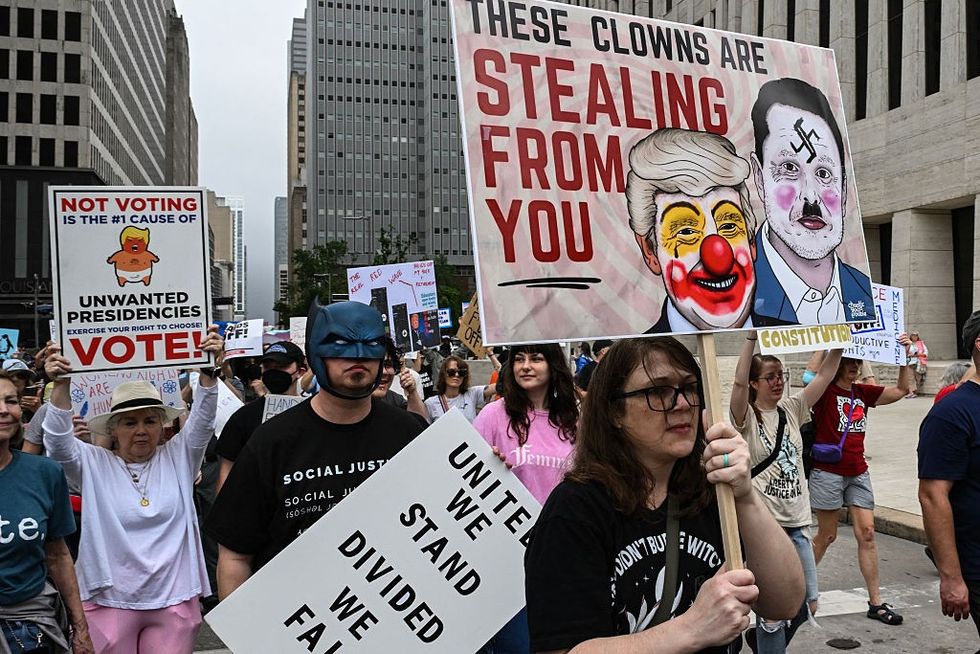
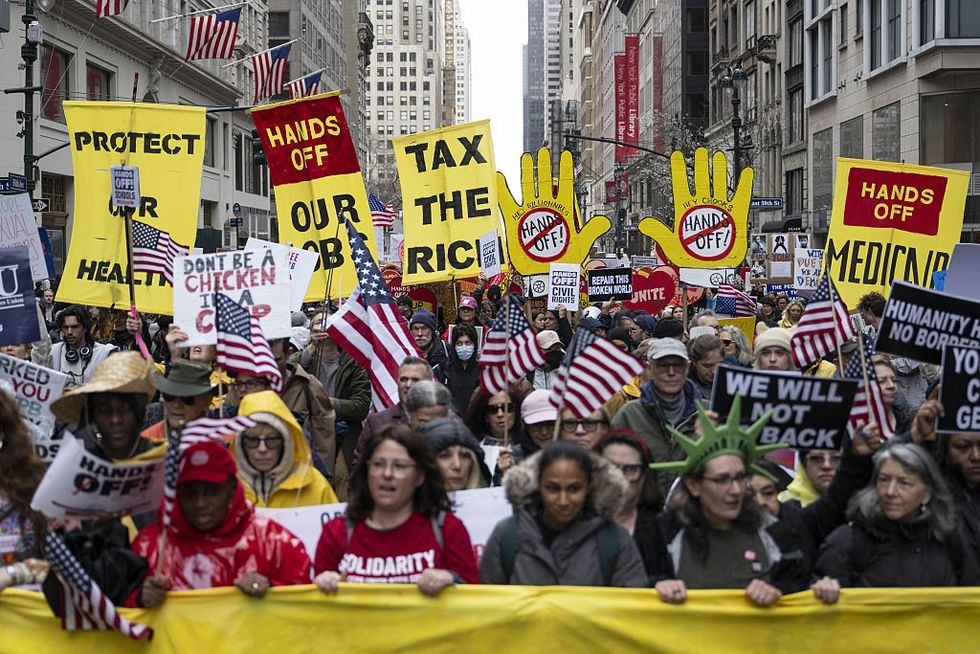
"Everyone involved in this crime against humanity, and everyone who covered it up, would face prosecution in a world that had any shred of dignity left."
A video presented to officials at the United Nations on Friday and first made public Saturday by the New York Times provides more evidence that the recent massacre of Palestinian medics in Gaza did not happen the way Israeli government claimed—the latest in a long line of deception when it comes to violence against civilians that have led to repeated accusations of war crimes.
The video, according to the Palestine Red Crescent Society (PRCS), was found on the phone of a paramedic found in a mass grave with a bullet in his head after being killed, along with seven other medics, by Israeli forces on March 23. The eight medics, buried in the shallow grave with the bodies riddled with bullets, were: Mustafa Khafaja, Ezz El-Din Shaat, Saleh Muammar, Refaat Radwan, Muhammad Bahloul, Ashraf Abu Libda, Muhammad Al-Hila, and Raed Al-Sharif. The video reportedly belonged to Radwan. A ninth medic, identified as Asaad Al-Nasasra, who was at the scene of the massacre, which took place near the southern city of Rafah, is still missing.
The PRCS said it presented the video—which refutes the explanation of the killings offered by Israeli officials—to members of the UN Security Council on Friday.
"They were killed in their uniforms. Driving their clearly marked vehicles. Wearing their gloves. On their way to save lives," Jonathan Whittall, head of the UN's humanitarian affairs office in Palestine, said last week after the bodies were discovered. Some of the victims, according to Gaza officials, were found with handcuffs still on them and appeared to have been shot in the head, execution-style.
The Israeli military initially said its soldiers "did not randomly attack" any ambulances, but rather claimed they fired on "terrorists" who approached them in "suspicious vehicles." Lt. Col. Nadav Shoshani, an IDF spokesperson, said the vehicles that the soldiers opened fire on were driving with their lights off and did not have clearance to be in the area. The video evidence directly contradicts the IDF's version of events.
As the Times reports:
The Times obtained the video from a senior diplomat at the United Nations who asked not to be identified to be able to share sensitive information.
The Times verified the location and timing of the video, which was taken in the southern city of Rafah early on March 23. Filmed from what appears to be the front interior of a moving vehicle, it shows a convoy of ambulances and a fire truck, clearly marked, with headlights and flashing lights turned on, driving south on a road to the north of Rafah in the early morning. The first rays of sun can be seen, and birds are chirping.
In an interview with Drop Site News published Friday, the only known paramedic to survive the attack, Munther Abed, explained that he and his colleagues "were directly and deliberately shot at" by the IDF. "The car is clearly marked with 'Palestinian Red Crescent Society 101.' The car's number was clear and the crews' uniform was clear, so why were we directly shot at? That is the question."
The video's release sparked fresh outrage and demands for accountability on Saturday.
"The IDF denied access to the site for days; they sent in diggers to cover up the massacre and intentionally lied about it," said podcast producer Hamza M. Syed in reaction to the new revelations. "The entire leadership of the Israeli army is implicated in this unconscionable war crime. And they must be prosecuted."
"Everyone involved in this crime against humanity, and everyone who covered it up, would face prosecution in a world that had any shred of dignity left," said journalist Ryan Grim of DropSite News.